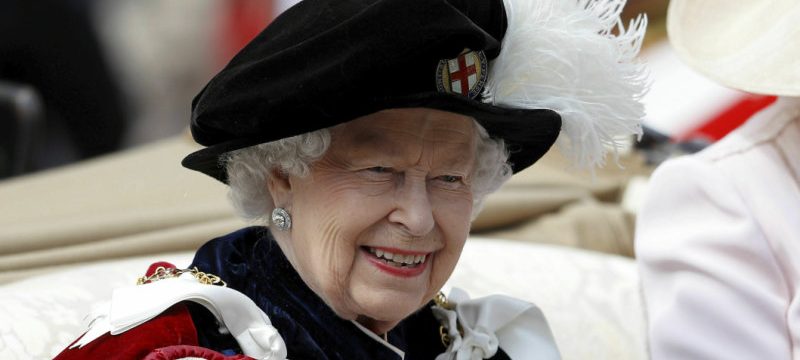London: A hundred and twenty one years ago, Queen Victoria’s Privy Council gathered in Windsor Castle for a solemn and ancient ceremony.
The job at hand: to prorogue – briefly suspend – the British Parliament.
The Queen still makes some of the rules.Credit:AP
The Clerk to the Council (recounts David Rogers in his history of the Council) handed the monarch the order and Victoria reached for a pen.
There was none to be found.
The Clerk, Sir Almeric Fitzroy, Knight Commander of the Most Honourable Order of the Bath, scoured a nearby desk, then flung open the door and called for the Groom-in-Waiting, an Old Etonian army officer who moved slowly, on account of his war wounds, to find a pen.
Eventually a pen was found, and everyone including the Queen was amused.
She needed a pen: Queen VictoriaCredit:Queen Victoria by Alexander Bassano/ National Portrait Gallery, London
This story is remarkable not so much because it’s stunningly hilarious, which it isn’t, but because it’s one of the rarest things in British constitutional records: an actual account of a Privy Council meeting.
Members of the Council, the Queen’s 700-strong coterie of advisers who adjudicate the exercise of a surprisingly broad range of powers that still rest solely with the monarch, take an oath that they will “keep secret all matters”. Until 1998, breaking that oath was a statutory act of treason. Now it’s just extremely bad form – in England, an equally terrifying disincentive.
Normally the Council is a constitutional sausage factory: few need to know how it works, and fewer care. But in the last few weeks the unwritten, centuries-old conventions that hold the country’s constitutional core together have been exploited, stretched and (say some) broken in the take-no-prisoners end-game of Brexit.
Privy Council meeting: one of the poshest moments of Jacob William Rees-Mogg’s considerably posh life.Credit:Getty
And at the core of it: the Privy Council.
Last week the Council met in Balmoral, Scotland, where the Queen likes to (or at any rate, always does) spend her summers.
On Tuesday morning Jacob Rees-Mogg, the government’s leader in the House of Commons and Lord President of the Privy Council, joined the Queen with two other counsellors to form a quorum.
Their aim: to get an order to prorogue Parliament to make it much more difficult for MPs to stop a no-deal Brexit.
Balmoral Castle.Credit:AP
It was a dastardly coup or a strategic masterstroke, depending on whom you ask. But it reminded everyone, as happens occasionally here, that one of the key institutions of their democracy is, well, not very democratic.
Rees-Mogg, asked about the visit on radio, was in a bind. Tradition entailed he couldn’t talk about what happened; to Rees-Mogg, tradition is next to godliness.
But he was obviously bursting to talk about one of the poshest moments of his considerably posh life. So he gave an “everyone knows what happens” explanation that he and the others stood to attention while he simply read out the order and the Queen said “approved”, with “no chat, no debate”.
And that is one of the most startling things about the Privy Council. The Queen is nowadays obliged to robotically accept its advice (she might sometimes be able to “advise and warn”, but must obey). It is entirely unelected. And it wields power over a remarkable range of British laws and institutions.
A notification from the Privy Council that the Queen has approved an order to prorogue Parliament. Credit:AP
But it is shrouded in deliberate mystery.
As Doughty Street Chambers’ Patrick O’Connor QC pointed out, the Privy Council is defined in law simply as the members of Her Majesty’s Honourable Privy Council. Much of its operation is custom and etiquette. For example, if a counsellor ever turned up uninvited to a meeting there is no legal rule to admit or reject them but “they would be snubbed”, Rogers wrote.
Its orders mostly bypass parliament but carry legal force as if they had. In the old days, sitting as the Star Chamber, the Council could punish rioters and the “misdoings of sheriffs” without a jury trial and could issue any sentence except death.
It is not clear that it doesn’t still have this power.
The Council is occasionally used to do things the Queen can achieve more quickly and easily than parliament. It ordered a pension for Captain James Cook’s widow and sons. In 1971, it ordered Chagos Islanders be deported to Mauritius to make way for a US military base. In 1984 Thatcher used it to order that spies at GCHQ couldn’t be union members
But the GCHQ case ran the first crack through the Council’s feudal carapace.
The House of Lords ruled that, if the Queen is illegally advised, her orders can be annulled.
Opponents of Brexit hope to wedge this crack wider this week.
The Privy Council is one of the oldest institutions of government in the world. Some scholars trace it back, dubiously, to the Witenagemot, an assembly of the ruling class in Dark Ages Britain. Others call it the poetic descendant of King Arthur’s Round Table.
It literally includes a Sir Launcelot – Sir Launcelot Henderson, a Lord Justice of Appeal who nobly went forth to fight for the right of property owners to “honest tax avoidance schemes” (in a recent reported case).
Yep, Privy Council facts are the best facts. And the British constitution is the weirdest constitution.
Source: Read Full Article





